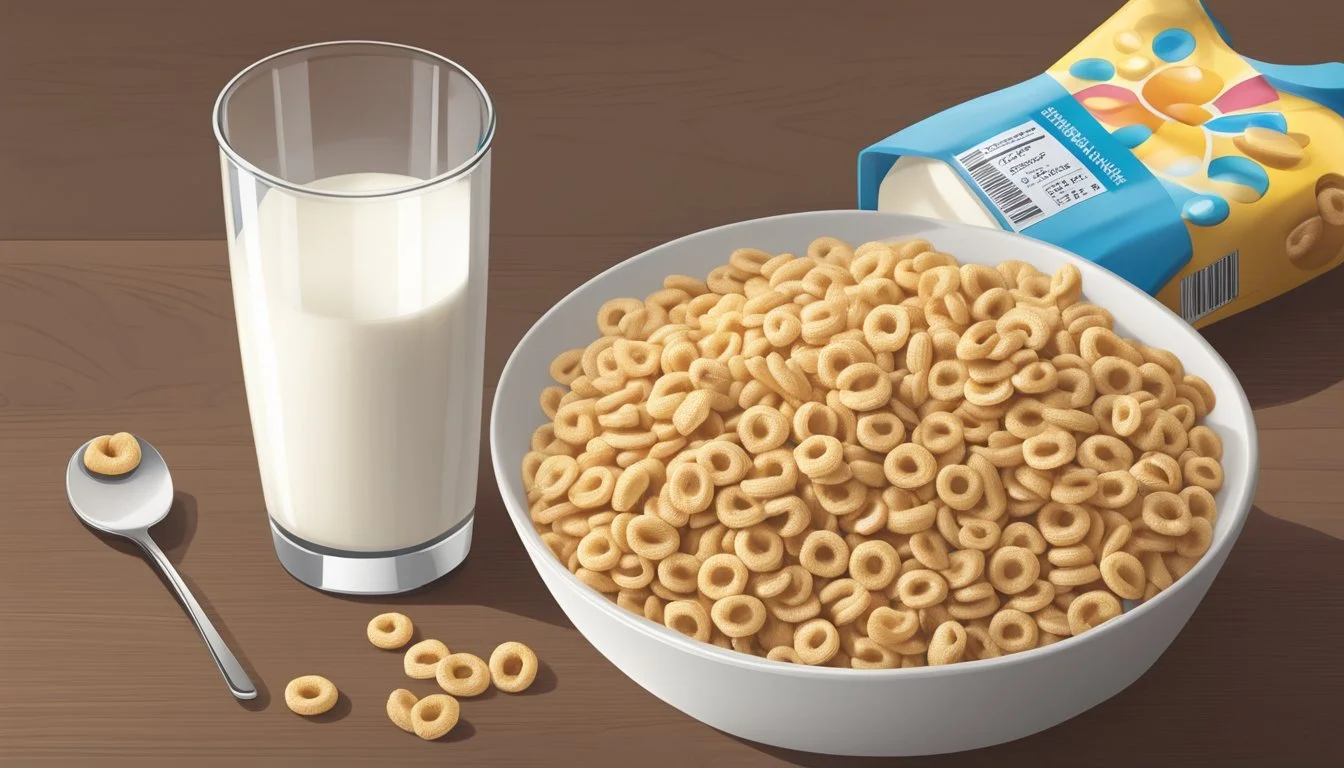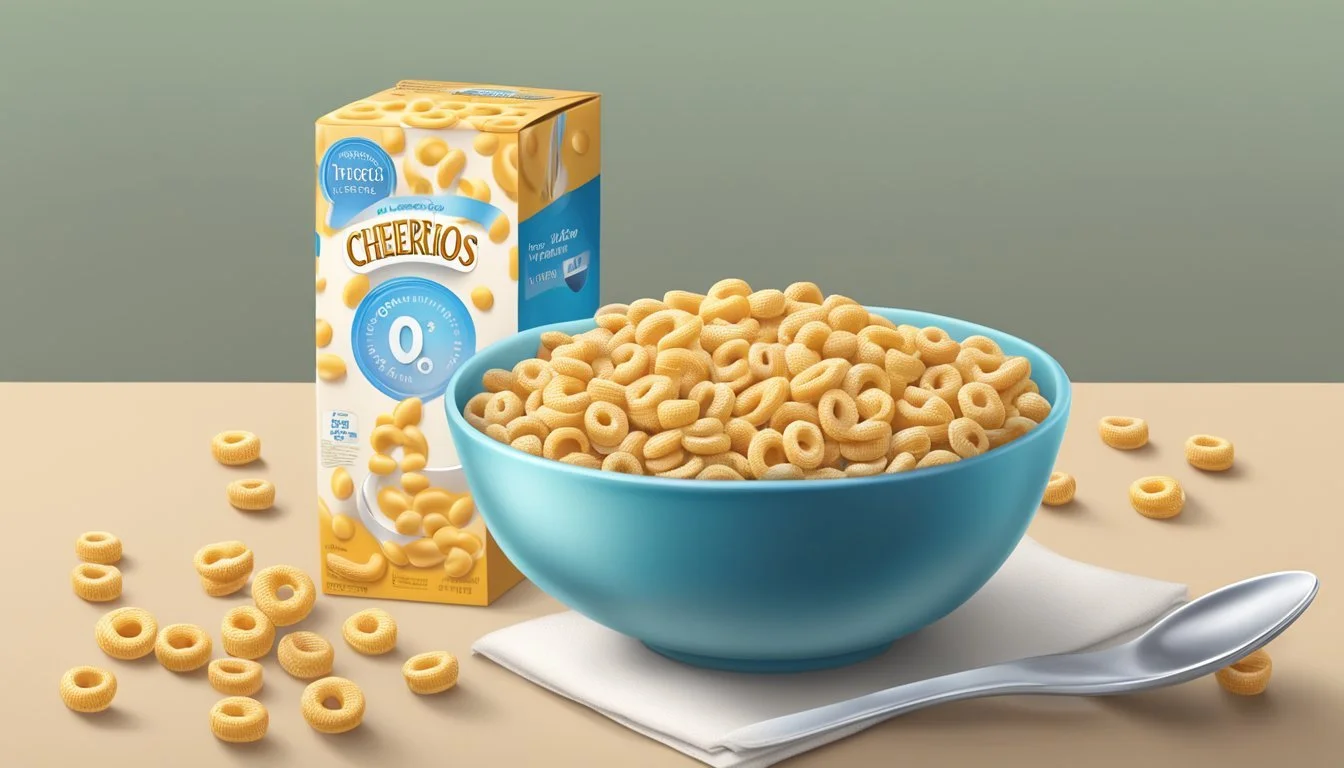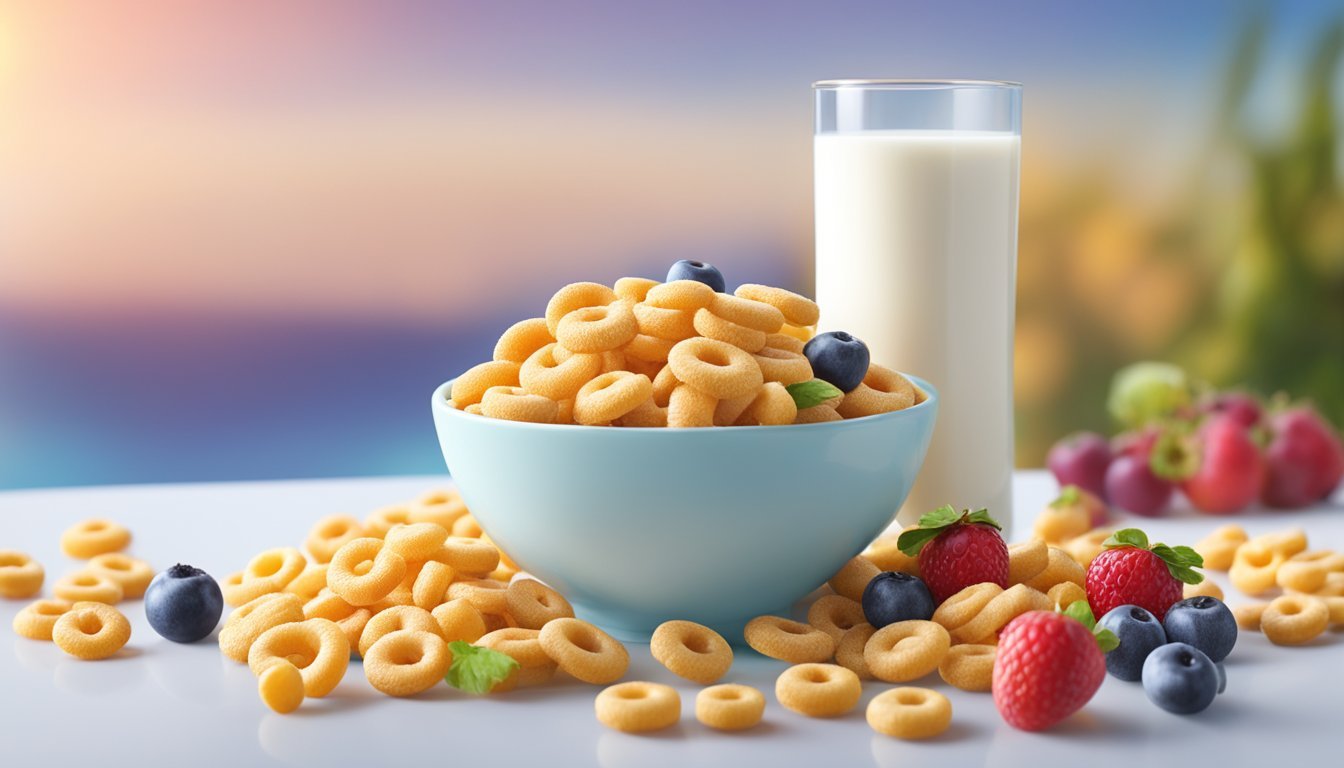Frosted Cheerios Nutrition Facts & More
A Balanced Breakfast Option
Frosted Cheerios are a popular breakfast cereal beloved by many for their sweet taste and satisfying crunch. This frosted version of the classic Cheerios adds a sugary coating to the familiar toasted oat rings. While tasty, some may wonder about the nutritional value of this cereal option.
A 3/4 cup serving of Frosted Cheerios contains 110 calories, with 85% coming from carbohydrates, 8% from fat, and 7% from protein. The cereal provides essential vitamins and minerals, including iron, vitamin A, and vitamin B6. With 12 grams of sugar per serving, Frosted Cheerios offer a sweeter start to the day compared to original Cheerios.
For those watching their nutritional intake, Frosted Cheerios can be part of a balanced breakfast when enjoyed in moderation. The cereal is gluten-free and contains virtually no fat, making it suitable for certain dietary needs. However, its higher sugar content may be a consideration for those monitoring their carbohydrate or sugar consumption.
Overview of Frosted Cheerios
Frosted Cheerios is a popular breakfast cereal produced by General Mills. It combines the classic whole grain oat Cheerios with a sweet frosted coating.
The cereal comes in an 18.4 oz family size box. Each serving contains 12 essential vitamins and minerals, making it a nutritious breakfast option.
Frosted Cheerios is made with 100% whole grain oats and is gluten-free. This makes it suitable for those with gluten sensitivities or celiac disease.
A ¾ cup serving (28g) of Frosted Cheerios contains:
110 calories
1g fat
22g carbohydrates
2g protein
The cereal is a good source of iron, vitamin A, and vitamin B6. It provides 58% of the daily value for iron, 17% for vitamin A, and 40% for vitamin B6.
Frosted Cheerios offers a balance between wholesome ingredients and sweet taste. It appeals to both children and adults looking for a flavorful yet nutritious breakfast cereal.
General Mills markets Frosted Cheerios as part of a heart-healthy diet. The whole grain oats can contribute to maintaining healthy cholesterol levels when consumed as part of a balanced diet.
Nutritional Profile
Frosted Cheerios offer a mix of essential nutrients, balanced macronutrients, and added sweetness. This cereal provides energy, vitamins, and minerals while containing moderate amounts of sugar and sodium.
Macronutrient Breakdown
A 3/4 cup serving (36g) of Frosted Cheerios contains 140 calories. The macronutrient composition is primarily carbohydrates, making up about 82-85% of the total calories. Fat content is relatively low at 1.5g per serving, accounting for 8-10% of calories. Protein contributes the remaining 7-8% of calories.
The total carbohydrate content is approximately 29g per serving. This includes 2g of dietary fiber, which aids in digestion and promotes feelings of fullness.
Vitamins and Minerals Content
Frosted Cheerios are fortified with several essential vitamins and minerals. The cereal is a good source of iron, providing about 58% of the daily value per serving. It also contains significant amounts of vitamin A (17% DV) and vitamin B6 (40% DV).
Other notable vitamins and minerals include:
Vitamin C
Vitamin D
Calcium
Zinc
Thiamin
Riboflavin
Niacin
Folic Acid
These nutrients contribute to various bodily functions, including immune support, bone health, and energy metabolism.
Sugars and Sweeteners
The sweet taste of Frosted Cheerios comes from added sugars. A serving contains about 12g of total sugars, with most of this being added sugar. This amount contributes to the overall carbohydrate content and calorie count of the cereal.
While the sugar content is moderate compared to some other sweetened cereals, it's important to consider this when managing daily sugar intake. The sweetness enhances flavor but should be balanced with other nutritional factors.
Sodium and Potassium Levels
Frosted Cheerios contain a moderate amount of sodium, typically around 180-190mg per serving. This represents about 8% of the recommended daily value for sodium intake. The cereal also provides some potassium, though in smaller amounts compared to sodium.
Balancing sodium and potassium intake is important for maintaining proper fluid balance and supporting heart health. While the sodium content is not excessively high, individuals monitoring their sodium intake should be aware of this contribution to their daily total.
Ingredients List
Frosted Cheerios contain a mix of whole grains, sweeteners, and added nutrients. The ingredient list provides insight into the cereal's nutritional profile and processing methods.
Whole Grains and Fiber Sources
Whole grain oats form the primary ingredient in Frosted Cheerios. These oats provide dietary fiber, including beta-glucan, which may help lower cholesterol. Corn starch is added to improve texture and shelf life.
The cereal's fiber content comes mainly from the whole grain oats. A serving typically contains around 2 grams of fiber, contributing to daily intake recommendations.
Sweeteners and Flavorings
Sugar and corn syrup give Frosted Cheerios their sweet taste. Brown sugar syrup adds depth to the flavor profile. These sweeteners contribute to the cereal's calorie content and affect its glycemic index.
Natural flavors enhance the overall taste experience. The specific compounds used are not disclosed on the ingredient list.
Additives and Preservatives
Trisodium phosphate serves as a preservative and acidity regulator. It helps maintain the cereal's crispness and extends shelf life.
Salt is added to enhance flavor and act as a preservative. Calcium carbonate and iron are fortified nutrients, boosting the cereal's mineral content.
These additives play crucial roles in texture, flavor, and nutritional value. They ensure the cereal maintains its quality from production to consumption.
Health Benefits
Frosted Cheerios offer some nutritional advantages despite their added sugar content. The cereal provides essential vitamins, minerals, and fiber that can support various aspects of health.
Cardiovascular Health
Frosted Cheerios contain whole grain oats, which are rich in soluble fiber. This type of fiber helps lower cholesterol levels, potentially reducing the risk of heart disease. The cereal is also low in saturated fat, further supporting heart health.
Whole grains in Frosted Cheerios may help regulate blood pressure. The cereal is fortified with iron, which is crucial for oxygen transport in the blood.
Digestive Health
The fiber content in Frosted Cheerios promotes digestive health. Fiber aids in regular bowel movements and helps prevent constipation. It also feeds beneficial gut bacteria, supporting a healthy microbiome.
Whole grains in the cereal provide prebiotics, which nourish good gut bacteria. This can improve overall digestive function and boost immune health.
Bone Strength and Growth
Frosted Cheerios are fortified with essential vitamins and minerals that support bone health. Calcium and vitamin D are crucial for building and maintaining strong bones. The cereal provides a portion of the daily recommended intake for these nutrients.
Iron in Frosted Cheerios contributes to proper growth and development, especially in children. The cereal also contains B vitamins, which play a role in energy metabolism and cell growth.
When consumed as part of a balanced diet, Frosted Cheerios can contribute to meeting daily nutrient needs for bone health.
Dietary Considerations
Frosted Cheerios have specific dietary considerations that consumers should be aware of. These factors include allergen content, serving sizes, and potential restrictions for certain diets.
Allergens and Dietary Restrictions
Frosted Cheerios are gluten-free, making them suitable for individuals with celiac disease or gluten sensitivity. The cereal is processed in dedicated gluten-free facilities to prevent cross-contamination. However, it contains whole grain oats, which may not be suitable for those with oat allergies.
Frosted Cheerios are free from common allergens like nuts, soy, and eggs. The cereal contains minimal fat and is low in sodium, potentially fitting into various dietary plans. It's important to note that Frosted Cheerios contain added sugars, which may not align with strict low-sugar diets.
Appropriate Serving Size
The recommended serving size for Frosted Cheerios is 3/4 cup (28 grams). This portion provides approximately 140 calories, 2 grams of fat, and 12 grams of sugar. Adhering to this serving size helps manage calorie and sugar intake.
A single serving offers 3 grams of fiber, contributing to the daily recommended intake. It's crucial to measure portions accurately, as consuming larger amounts can lead to increased calorie and sugar consumption. Using a measuring cup or food scale can help ensure proper portion control.
Understanding the Nutrition Label
The Nutrition Facts label on Frosted Cheerios provides essential information about serving sizes, calories, nutrients, and vitamins. Careful examination of this label can help consumers make informed decisions about incorporating this cereal into their diet.
Reading Serving Information
A typical serving of Frosted Cheerios is 1 cup (36 grams). This serving contains 140 calories, with 18 calories coming from fat. The label also indicates the number of servings per container, which varies depending on package size.
It's important to note that many people consume more than one serving in a single sitting. Adjusting the nutrition information for larger portions is crucial for accurate dietary tracking.
Decoding the Vitamins and Minerals Section
Frosted Cheerios are fortified with several essential vitamins and minerals. The label lists percentages of Daily Values (DV) for each nutrient based on a 2,000-calorie diet.
Key vitamins include:
Vitamin A
Vitamin C
Vitamin D
Vitamin B6
Vitamin B12
Folate
Important minerals:
Iron
Calcium
Zinc
Magnesium
These added nutrients contribute to the cereal's nutritional profile, supporting various bodily functions and overall health.
Analyzing Fat Content
The fat content in Frosted Cheerios is relatively low. A single serving contains 2 grams of total fat, which is 3% of the daily recommended value. This includes:
0 grams of saturated fat
0 grams of trans fat
Small amounts of monounsaturated and polyunsaturated fats
The low fat content makes Frosted Cheerios a suitable option for those monitoring their fat intake. However, it's essential to consider other nutritional aspects, such as sugar content, when evaluating the cereal's overall healthfulness.
Comparing with Other Breakfast Options
Frosted Cheerios can be evaluated against other cereal options to understand its nutritional profile. Key factors include sugar content, fiber, and overall nutritional value compared to both Cheerios variants and competing brands.
Cheerios Variants Comparison
Frosted Cheerios differ significantly from Original Cheerios in sugar content. While Original Cheerios contain 1 gram of sugar per serving, Frosted Cheerios have 9 grams. This increase affects the overall calorie count.
Fiber content remains similar across variants. Original Cheerios provide 3 grams of fiber per serving, matching Frosted Cheerios. This maintains the cereal's digestive health benefits despite added sweetness.
Protein levels stay consistent at 3 grams per serving for both varieties. Vitamin and mineral fortification also remains comparable, with both offering essential nutrients like iron and B vitamins.
Frosted Cheerios vs. Other Brands
Compared to other sweetened cereals, Frosted Cheerios offer a moderate sugar content. Some competitors contain up to 12-15 grams of sugar per serving, making Frosted Cheerios a slightly better choice for those monitoring sugar intake.
Fiber content in Frosted Cheerios (3g per serving) is competitive. It surpasses some popular sweetened cereals that provide only 1-2 grams of fiber per serving. This higher fiber content contributes to satiety and digestive health.
Frosted Cheerios contain less protein than some nutrition-focused cereals. Brands like Kashi often provide 6-8 grams of protein per serving, compared to Frosted Cheerios' 3 grams.








